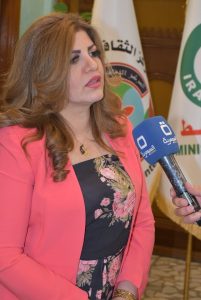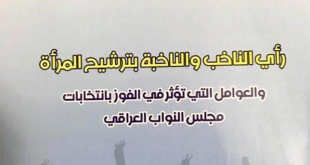Dr.Nibras Al-Mamory
Despite the natural resources enjoyed by the African continent, which is the largest on the continents of the world, but poverty is a feature known to the continent, perhaps this resources were a major reason for the continued colonial domination, economically, Africa has enormous wealth represented by agricultural, with nearly two thirds of the continent’s population working in agriculture due to environmental and climatic diversity, Africa is also characterized by the existence of huge forests, with the wood industry contributing 6% of the domestic product of the African continent and these are exported to several countries such as the European Union, Japan and Israel, at the sea level, African countries have a huge stock of fish and produce 4.5 million tons of fish in West Africa.
Africa is characterized by a large quantities of minerals such as gold in South Africa, Zimbabwe and Sudan, and copper metals in Zambia, Sudan, Congo, and oil, Africa has about 124 billion barrels of oil reserves, that means12% of the global reserves in Libya, Algeria, Egypt, Sudan, Nigeria and Equatorial Guinea, There is also a significant stockpile of uranium in South Africa, Niger and Namibia, Africa alone accounts for 18% of the world’s total production, and has a reserve of one-third of the world’s total reserves. Africa is one of the largest producers of global diamonds, accounting for nearly 40 percent of the world’s total diamonds especially in Angola, Botswana, the Democratic Republic of Congo, South Africa and Namibia, there is a strange thing that some of the civil wars in the continent have been financed by this material, therefore the diamonds from those areas are now known as blood diamonds, which were an important tool for financing the conflict and internal strife.
Faced with high levels of violence and internal strife, the African Union, during the 32nd AU Summit, held in the Ethiopian capital Addis Ababa, tried to find a formula for joint African cooperation on refugees, terrorism and economic cooperation, and the initiative to stop using guns by 2020, which was highly welcomed by the UN Security Council through Resolution 2457 to rid the African continent of conflicts and create conditions conducive to growth and development, and to make it free of conflict, although the UN system is well aware that gun stopping in Africa requires the involvement of all stakeholders, strengthening societies with strong institutions and good governance depends on solutions to economic crises and natural disasters.
Problems plaguing the African continent:
1- At least 22 African countries suffer from armed conflicts in one way or another such as Southern Sudan, Central Africa, the Democratic Republic of the Congo and others.
2- The level of external debt in African countries according to the IMF and World Bank institutions increased from 25.2% of GDP in 2010 to 34.5% in 2015, and increased by 2017 to $ 535 billion. Undoubtedly, dependence on these foreign loans creates a constraint of dependence that cannot be abandoned, and for more than 40 years in which African countries have received aid and foreign loans, many questions still arise: What has this aid achieved? Why did not they lead to improved living standards or conditions for sustainable development?
3- According to the report of the America “Wall Street Journal”, the amount of money smuggled illegally outside the African continent worth $ 60 billion annually, this deprives the world’s poorest continent from capital and tax revenues that will contribute to the promotion of economic growth.
4- Increased poverty and declining living conditions throughout the continent have created fertile ground for the spread of infectious diseases, deteriorating health, and about half of the population has no access to sterile water and adequate sanitation, in 2001, the World Health Organization (WHO) reported that nearly 3,000 people die every day from malaria, and more than 17 million Africans died of HIV / AIDS, It is estimated that more than 28 million of the 40 million people living with the disease worldwide are in Africa. More than 12 million orphans in Africa have lost their mothers or both parents to AIDS, and 20 million Africans face death Starvation in many of African States.
5- African countries suffer from the spread of financial and administrative corruption. According to the Transparency International Report 2017, only five African countries managed to overcome the Corruption indicator with more than 50 points out of 100, which are Botswana, Cape Verde islands, Mauritius, Rwanda and Namibia. The report of the United Nations Economic Commission said that the coffers of African governments annually lose 148 billion dollars because of corruption and according to World Bank reports, corruption has contributed to the transfer of 400 billion dollars of the continent’s funds to accounts and real estate abroad, of which 100 billion dollars from Nigeria alone.
6- There are 30 million mines in Africa alone out of a total of 110 million mines left behind by wars in the world hinder the development movement in 18 African countries, including 23 million mines in Egypt since the Second World War.
7- The drop of education level and the increase in illiteracy by up to 60% in many African countries, especially as estimates of expected population growth show that Africa is the fastest growing region in the world, with the youth population increasing, Which will account for about 60% of the total population by 2050, these young people need education, employment, housing and health care.
8- The problems created by the borders drawn between the African countries and the way the Europeans used to divide Africa during the Berlin Conference of 1885, European countries did not take into account any special considerations such as ethnic and linguistic homogeneity, economic integration and cultural heritage, for the purpose of serving the European interests, and these borders resulted problems and conflicts between African countries after the colonial period, especially those countries that have pastoral tribes and in Africa there are more than 50 political units, of which 13 are political units with no sea ports.
Most of the problems and crises that we have touched on and Africa suffer from today are linked to the legacy of the colonial period and the absence of institutional action based on good governance and leadership, eventually led to mismanagement of the state and widespread corruption as well as external challenges that make development and advancement difficult to verify, and it is possible to address the American and Chinese axes and their impact on the future of the African continent.
Interests of the United States of America on the African continent:
Despite the US discourse on democracy and human rights, the truth is that past United States relations with Africa did not go beyond the interest and promotion of the anti-communist spirit on the continent, In addition to providing restricted financial loans, observers and experts have described the US policy in Africa under the administration of former President Barack Obama by “proactive”, where his administration tried to focus on maintaining the constitutional government in some African countries, and imposing sanctions on leaders of “terrorist groups”, Especially since the United States was able to extend its lease to the military base of (Limonene) in Djibouti for another ten years in return for an annual rent of $ 38 million, The rent of military base is one of the most important sources of national income for Djibouti, this military base has about 4,000 American soldiers, making it the permanent military base of the United States of America in Africa, Djibouti, which is a member of the League of Arab States, is the strategic starting point for the United States in its fight against “terrorism” in Africa and the Arabian Peninsula, particularly Yemen and Somalia.
For the economic aspect, the United States has supported its trade with Africa through the African Growth and Opportunity Act (AGOA), which aims to establish strong trade relations with selected countries in the region and set a time limit for this agreement for ten years from June and until September 2025, under AGOA, total US exports to Africa rose to 22%, which equal to $ 10 billion, and total US imports from Africa increased by 40%, which equal to $ 50 billion, about 15% of the oil needed by the United States comes from Central and West Africa.
Despite the magnitude of US investment in Africa, the US trade relationship with Africa remains at an underdeveloped level, and has been declining since 2011, especially as the US budget deficit problems which restricted its movement in Africa, as well as the existence of civil and human rights groups that always pose the problem of the absence of democracy and human rights violations in many African countries. In addition, the election of President Trump did not lead to radical changes in US foreign policy towards Africa, after the reduction of development aid directed to the outside, which represents 1% of the federal budget, and the share of Africa of this aid is often subject to respect for human rights issues and the development of democracy, it has also been clear that Trump administration does not have any alternative plan toward Africa to reduce Chinese and European expansion.
China’s role in Africa:
China’s role in Africa is characterized by the use of soft power tools, such as popular and cultural diplomacy, economic and humanitarian aid. China also has the money and political will, as well as the absence of internal opposition that freeing its African policy from any obligations related to issues of freedoms and human rights.
China has been Africa’s largest trade partner since 2009, with bilateral trade reaching about $ 11 billion in 2000, rising to nearly $ 60 billion in 2006 and then jumping to about $ 210 billion in 2013, China’s investment in Africa has increased nearly threefold in the last decade. South Africa and Ethiopia are among the top leaders in terms of Chinese investments, it should be noted that the main objective of Chinese investment is access to oil and mineral resources owned by some African countries, such as Nigeria, Algeria, Congo etc., the evidence is that 90% of African countries’ exports to China belong only to oil, minerals and gas, making the trade balance more favorable to China at the expense of those countries whose economies remain volatile due to fluctuating oil prices globally. According to a study by “the US agency Makenzi”, more than 1,000 Chinese companies are currently operating in Africa. Some resources say 2,500 companies, 90% of them private companies, expected China’s financial profits from Africa in 2025 to reach $ 440 billion, an increase of 144%.
However, there is criticism of the nature of the role of China in Africa because it acquired oil and minerals in Africa, and got allies to vote for its side in the United Nations, but did not care about infrastructure projects or initiative to exempt billions of debt owed by African countries.
When discussing the African possibilities for achieving a continental renaissance, it is necessary to examine the political and economic measures at the continent level:
1- Political and Economic Partnership for the African Continent: Politically, the African Union was announced in July 2002 to enable Africa to realize its political and economic independence and to provide institutional mechanisms that enable it to achieve sustainable development and the causes of underdevelopment. Creating continental space along the lines of other blocs in Europe, Asia and America, The African Union has begun its functions politically and economically, but has faced several problems of financing because of:
· The inability of some members to perform their annual dues.
· The Union lacks mechanisms to impose peace and prevent conflict and impose the issue of human rights.
· The consolidation of democracy in most African countries.
· The challenge of social and economic problems.
· The establishment of the World Trade Organization (WTO) which affected the African economy.
· The increasing influence of major blocs of geo-cultural organizations associated with foreign powers at the expense of African regional organizations.
2- Cooperation among African entities: in this regard several of new regional groupings has established, and other continental blocs also developed, these gatherings aim to create a special economic and political space through the establishment of a comprehensive union based on the integrated development strategy that includes:
· Investment in all fields.
· The elimination of restrictions on the freedom of movement of persons, capital, residence and property.
· To contain the hotbeds of tension and conflict resolution among Member States.
· To achieve a comprehensive continental African unity, such as the East African Union and the Common Market for Eastern and Southern Africa known as (BALCOMISA) and the Economic Community of West African States (ECOWAS) and the Southern African Development Community (SADC).
Despite the progress made by some of active African economic blocs, but the achievement of the issue of economic integration is facing many difficulties, most notably:
· Lack of political will to implement integration plans.
· The provision of political conflicts at the expense of economic interests.
· The lack of infrastructure compatibility with physical integration.
In spite of all these difficulties, these economic blocs remain a continental institutional framework that provides great opportunities for the development of the peoples of the continent after they have been rehabilitated and adapted to the strategies and policies of African countries. In particular, there is a demographic dividend that can be invested through quality education, teacher training, which would lead to enhanced productivity and job creation.
Africa today presents a dynamic image that contrasts with progress and challenges. On the one hand, economic growth in several African countries has surpassed that of other parts of the world. The rate of primary school enrollment in sub-Saharan Africa rose from 52% in 1990 to 80% in 2015, and child mortality rates have declined.
However, some regions of Africa face threats and challenges as a result of armed violence and human insecurity. The continuation of the conflict has resulted in three of the four countries currently facing a serious threat of famine in Africa.
Some countries in Africa have experienced a real income increase of more than 30% and expected GDP growth of about 6% over the next 10 years. In Africa, there are seven countries among the ten fastest growing countries in the world and this can be considered as an indicator of achieving progress on the African continent.
Conclusion:
In general, the backwardness, corruption and poverty in Africa are extremely dangerous, and the governments of the countries of the continent are called for change, especially after the emergence of rebellious and revolutionary movements in the countries of the continent condemning the policies of those countries, In order to face the backwardness experienced by the African continent, it is necessary to develop the capacity of human potentials, enhance competencies and invest all available resources for African countries in their development project, And exploit them scientifically through planning to establish small industries matching the possibilities available in the African countries themselves.
As well as the development of a plan of education to achieve scientific and technological independence; because economic and political independence is of no value unless scientific and technological independence is achieved, in addition to the importance of creating a unified African market, and to integrate its economy with technology, to integrate infrastructure and financial and administrative reform.
In order to face unequal economic exchanges, it is necessary to change the primitive approach in the agriculture and mineral sectors to a different practical method that ensures the improvement of the stages of manufacturing the raw materials to produce a good income that can continue on the path of development, especially as the continent has raw materials and cheap labor.
The problem of external financing is that African countries have to save part of their currencies which import materials manufactured from foreign countries. This saving is directed at investing in manufactured, intermediate and necessary materials, thus significantly limiting loans and external financing, and with regard to the balance of power and confronting the repercussions of international disparities, there is no solution except in the regional blocs politically and economically, for the purpose of accelerating the settlement of disputes and consolidating the pillars of development and economic integration.
All this cannot be achieved unless there is a foundation for democracy and the creation of competencies that work for the national interest, unite at the continental level, all forming a homogenous front against the new colonialism and its methods, and to eliminate the fragmentation, division and differences inherited by the African countries as a result of the old colonialism.
Finally, with the conclusion of the 30th African Summit in Addis Ababa in January 2018, African Union President Paul Kagame announced that “the African continent is no longer waiting for the benevolence of other countries to improve its conditions, but will rely on itself to exploit its enormous resources to eradicate poverty and achieve progress, prosperity for their people, and work hard to combat corruption that hinders the development of the continent.”
And in front of revolutions, especially what happened in Sudan recently, which has become a major threat to the interests of dictatorships the question is whether the African summits will be limited to declarations, denunciations and promises, or will be transformed in accordance with the rapid and critical changes of the stage, to serve as a catalyst for the democratic transformation and change that the African continent must undergo?
email:nbrasalmamory73@yahoo.com

 منتدى الإعلاميات العراقيات-iraqi women journalists form موقع منتدى الاعلاميات العراقيات- اول منظمة مجتمع مدني عراقية تعنى بالاعلام والمرأة
منتدى الإعلاميات العراقيات-iraqi women journalists form موقع منتدى الاعلاميات العراقيات- اول منظمة مجتمع مدني عراقية تعنى بالاعلام والمرأة


